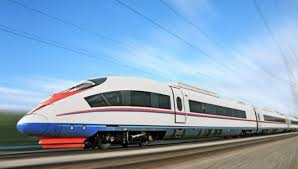Russian President Vladimir Putin recently announced the commencement Moscow-St. Petersburg high-speed rail. The news was shared during a teleconference, on March 14 by the Russia owned news agency TASS. Putin stressed the importance of obtaining all approvals and beginning the effort required for this ambitious endeavor.
In the teleconference Putin emphasized addressing pending issues to ensure progress of the project. He restated his commitment from meetings to start construction once all essential matters are resolved. This announcement reaffirmed the governments determination to advance with the high speed railway construction marking a stride in enhancing transportation infrastructure in Russia.
Putins support for the high speed rail aligns with his vision for expanding Russias railway network towards eastern regions from Moscow. He outlined plans to extend the network to include cities like Nizhny Novgorod, Voronezh, Kazan and potentially reaching into the region. This ambitious plan mirrors Putins strategy to boost connectivity and foster economic growth in parts of the country.
Although discussions about this rail link gained momentum in 2019 economic challenges since 2020 have temporarily slowed down progress, on this initiative.
Moreover the decision to halt operations on three railway routes originating from Moscow, which include two lines and one heading to Nizhny Novgorod highlights the urgent need, for upgrading Russias transportation infrastructure.

Nonetheless progress picked up again recently with the endorsement of a plan for the Moscow St. Petersburg route indicating a renewed dedication to pushing with the initiative. The approval of this plan marks a step in advancing the project setting the stage for construction phases and execution.
At present the existing railway connection between St. Petersburg and Moscow runs at speeds of up to 200 km/h (124 mph) serving as a transportation link between these cities. However travel time typically ranges from three and a half to four hours emphasizing the necessity for enhanced infrastructure to shorten travel durations and improve efficiency.
Scope
The proposed high speed rail project aims to tackle these issues by reducing travel times between Moscow and St. Petersburg. Trains on this line are projected to operate at speeds of 250 km/h (155 mph) slashing travel time between both cities to, under two and a half hours.The considerable reduction, in travel times will not make commuting and traveling more convenient. Also boost economic activity by enabling quicker transportation of goods and people between the two cities.

Construction cost
While the exact construction costs remain uncertain estimates have varied from US$6 billion to $15 billion to $36 billion since discussions began in 2019. Although the project requires an investment it highlights the governments dedication to modernizing Russias transportation infrastructure and fostering growth.
In general commencing construction on the high speed railway connecting Moscow and St. Petersburg signifies an achievement in Russias endeavors to improve transportation links and effectiveness. Through investments, in infrastructure initiatives the government seeks to spur progress enhance regional connectivity and elevate the overall standard of living for its populace.
Read also The Top 10 Largest Railway Networks Globally
Read also Europe-Africa Rail Tunnel Project to Connect Two Continents